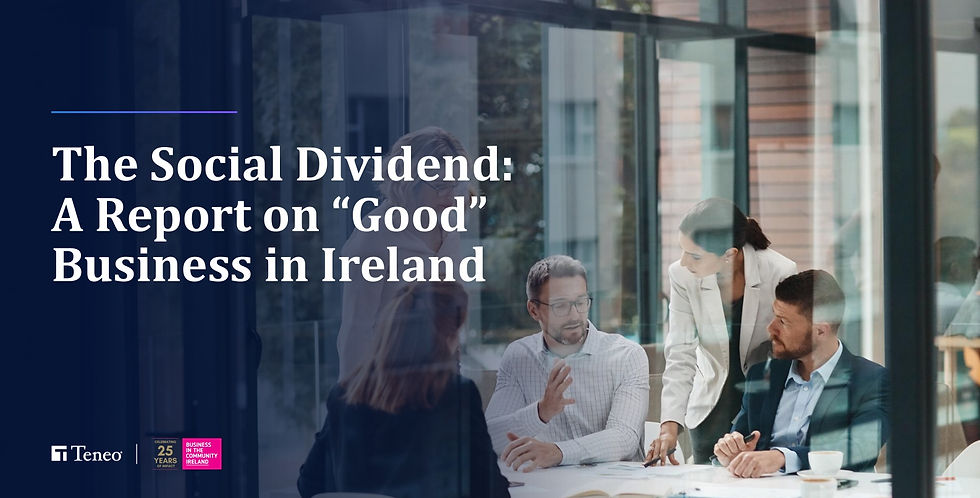Driving The Social Dividend: How Business and Society Intersect in Ireland Today
- Marielle Onana
- Aug 1, 2025
- 3 min read
Updated: Aug 2, 2025

What does social impact really mean for businesses in Ireland? Earlier this year, I had the chance to contribute to The Social Dividend: A Report on ‘Good’ Business in Ireland, a landmark project led by Teneo in partnership with Business in the Community Ireland (BITCI).
For me, it was more than a fascinating project. It was a turning point in my learning journey about corporate responsibility, and a real eye‑opener on what these shifts mean for us as communicators.
The research wasn’t just a desk exercise: it involved 25 in‑depth interviews with Irish CEOs and C‑suite leaders (think Vodafone, Bank of Ireland, Heineken, IBM) and a survey of 119 professionals across sustainability, HR, comms, and strategy.
Here are some key takeaways from the report:
🌱 ESG: More Than Just Buzzwords
We’ve all heard the acronym ESG. Sometimes it gets thrown around like the “gluten‑free” of corporate strategy: everyone says it, not everyone explains it. But here’s the gist: Environmental, Social, and Governance practices are how businesses show they care about more than just profits.
🛠 Authenticity Still Wins
Authenticity is not optional. Companies that tie social strategy to core business objectives (and communicate it clearly) perform better, avoid greenwashing criticism, and build trust over time.
Leaders stressed that the strongest results came when impact was tied directly to business outcomes, not left as “nice‑to‑have” optics.
📈 Social Impact = Business Value
Leaders report positive results, like a company reducing staff turnover from 5% to 1.6% after investing in employee-led social initiatives.
Social impact strategies aren’t just ethical; they also bring customer loyalty, stronger reputations, innovation, and retention benefits.
👔 Directors Agree: Social Strategy Is Non‑Optional
Survey findings show that nearly one in three Irish CEOs believe their businesses won’t survive the next decade without major reinvention rooted in social impact.
As the World Economic Forum points out, corporate responsibility makes financial sense. Organisations that overlook ESG risk being seen as out of touch, and losing financially.
Why This Matters in Ireland Right Now 🇮🇪
Ireland is at a turning point with the EU's Corporate Sustainability Reporting Directive (CSRD) now being implemented. For many companies here, the first reporting deadlines are already live and for others, the clock is ticking.
To put this in context: according to Ropes & Gray’s July 2025 CSRD Transposition Tracker, Ireland recently formally joined countries like France and Estonia in adopting the “Stop the Clock” directive, which delays reporting deadlines for some businesses. That means Irish companies are very much on the playing field now, even if the EU’s rollout hasn’t exactly been a sprint.
And it’s not just about compliance. Alan Tyrrell (SMD at Teneo Ireland), who co-authored the report, explained that social impact isn’t a box‑ticking exercise. It’s a strategy for long‑term trust and competitiveness. Companies can't (and shouldn't try to) separate their business impact from their impact on society.
What I Learned as a Junior Communicator ✍️
The language matters. Striking the right tone is everything: too corporate, and people roll their eyes; too vague, and you lose credibility.
ESG is about people, not just policy. Whether it’s employees, communities, or stakeholders, stories that connect on a human level have the most impact.
Corporate responsibility is about building loyalty, trust, and resilience (and, yes, a future).
More resources about ESG in Ireland📚

Comments